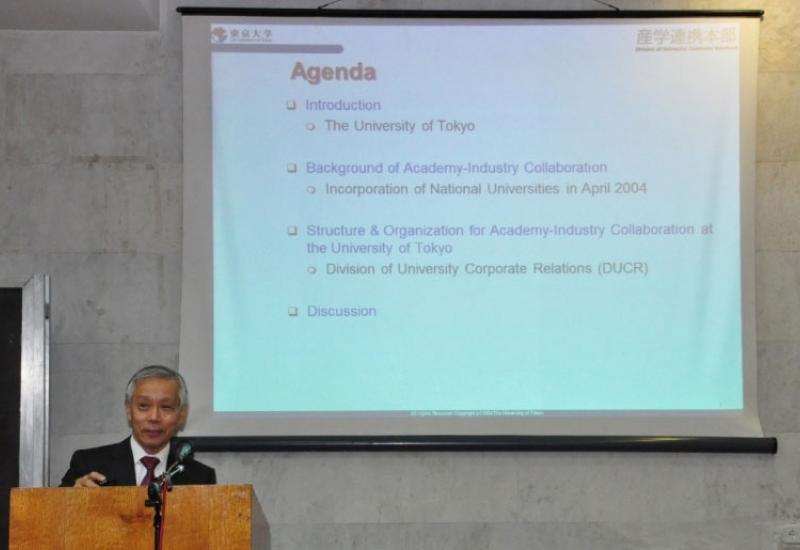On October, 24 the Vice President of the University of Tokyo, professor Yoishyro Matsumoto read a lecture at NTUU "KPI", due to the "Developing and encouraging partnerships between higher education and industry - joint research, technology transfer and university entrepreneurship."
As the Vice-director of NTUU "KPI" for International Relations Sergei Sidorenko emphasized, opening the meeting, the theme of the lecture is important not only for the future professionals who are going to work at academic institutions and industry, but also for understanding the general processes of economics and scientific-technical field, that occur in the world.
Plenipotentiary Ambassador of Japan in Ukraine Toichi Sakata represented professor Matsumoto to the audience. "I am happy today to be among the students and professors of NTUU" KPI "and present my friend, whom I have known for over 40 years, Professor of Tokyo University Yoishyro Matsumoto - said Toichi Sakata. - He has a brilliant academic endowments. His numerous achievements are marked by many awards and honors. Recently, he was elected to the post of the president of Japan Society of Machine Engineers. For many years he has worked as the Dean of the Faculty of Engineering, and now he is a vice-president of the University of Tokyo. He has a great experience in rersearch work and innovation management. So I hope the lecture of professor Matsumoto will be interesting and useful for all teachers and students of the Kiev Polytechnic Institute".
The speech of Professor Matsumoto was quite abundant with specific examples of innovative activities of the university in which he works, it was especially interesting as a successful implementation of new management technologies in innovation sphere and at the same time, a as a successful combination of educational process and work in order to solve real scientific and technical problems. The things, about which lecturer talked, were also interesting but for that fact, that Yoshyro Matsumoto presents the oldest and the most famous research university in Japan, that, by the way, according to all international ratings is included in the list of top 30 best universities in the world. Besides training units, its structure consists of 11 research institutes and 24 research centers.
It should be noted that the Tokyo University is a leading Japanese university not only in teaching and research, but also in innovation. It is building slender system of scientific ideas and bringing them to the level of actual use and commercialization. Department of corporate relation is created, which included the office of innovation and entrepreneurship, Office of Intellectual Property and Corporate Relations. This «headquarters innovation» is subject to Vice President of the university and the university takes care of the network corresponding substructures. Since 2005, the Tokyo University established a 6-month educational program in entrepreneurship and business planning. Now it is recognized as one of the most important initiatives of University. Moreover, in 2007, there was opened the incubation fund for university start-ups, the extent of which is astonishing: it carries out its activities in a specially seven-story building, which contains 30 subdivisions and given areas under 30 different laboratories. In projects that are being implemented, involving 69% of undergraduate and graduate students receiving education in natural sciences and engineering fields, and 31% of students studying humanities and sociology! Not surprisingly, the Tokyo University is one of leading Japanese universities on indicators of successful start-ups.
We should not forget that the scientists research and development, postgraduate students and students of the Tokyo University are in demand of famous Japanese corporations: among the partners of the University there are famous brands, such as: «Panasonic» (Matsushita Electric Industrial Co., Ltd), «NEC Corporation», «NISSAN Motor Co., LTD», «HITACHI», «FUJITSU» and others. Then it affects the university funding – more than half of its annual budget up funds to fulfill agreements, grants to perform certain research, sponsorship and public donations.
It is worth mentioning that the innovative activity of Japanese universities obtained special acceleration after the reform of 2004 when the state gave public universities independence and the ability to obtain intellectual property rights in the development of researchers. The authorities provide maximum help to this area of work of universities.
The experience of Tokyo University is a great example of the results, provided by policy to economy.

